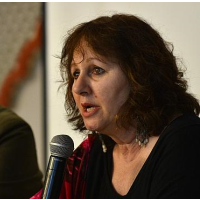Police, Activists Criticize BBC Documentary on Dec 16 Rape
 Filmmaker Leslee Udwin at a press conference in Delhi on Tuesday (photo: AFP)
Filmmaker Leslee Udwin at a press conference in Delhi on Tuesday (photo: AFP)
In the controversy surrounding the BBC documentary film on the December 16, 2012 brutal gang rape in Delhi, the police and activists have found themselves on the same side against the filmmaker. Delhi Police on Tuesday obtained a restraining order from a court against the film’s broadcast, while activists raised questions over its “white saviour” complex.
‘India’s Daughter’ is a documentary film by British filmmaker Leslee Udwin scheduled to be screened on March 8 (International Women’s Day) by BBC Four and television channels in seven other countries, including NDTV in India. The hour-long film is based on interviews of the victim’s parents, as well as the convicted rapists and their families and lawyers.
The documentary sparked off a furore over its interview of convicted rapist Mukesh Singh who was awarded the death sentence and is currently held in Tihar Jail. In his interview he appeared to blame the rape victim Nirbhaya for her death, allegedly claiming that she would not have been killed if she had not fought back.
“A girl is far more responsible for rape than a boy … A decent girl won’t roam around at nine o’clock at night … Housework and housekeeping is for girls, not roaming in discos and bars at night doing wrong things, wearing wrong clothes,” Singh said, suggesting that people "had a right to teach them a lesson".
These comments, excerpts of which were released to the media in advance, were criticized for providing the killer a platform to justify his crime.
The Information & Broadcasting Ministry issued an advisory on Tuesday to all news channels asking them to not telecast the documentary.
Earlier in the day, a Delhi court passed an order restraining its telecast: “Mukesh Singh… made offensive and derogatory remarks against women creating an atmosphere of fear and tension with the possibility of public outcry and law and order situation. …The court has passed order prohibiting the publication/transmission of the interview till further orders.”
There was much handwringing among officials over how a foreign filmmaker was granted access to interview a convict on death row. According to Udwin, she was granted permission by Vimla Mehra, the then Director General of Tihar Jail, to interview Singh in October 2013. She interviewed the convict for over 3 days.
“According to the permission granted to us, we were supposed to show all unedited raw footage of the interview to Tihar Jail authorities. After I conducted a 16-hour long interview of Mukesh, I submitted it for viewing to a three-member panel of Tihar Jail officials. They said it was too long to watch and instead asked for an edited shorter version of the footage. I submitted the edited version which was cleared. I have all the documents and the permission letters granting me access to Mukesh Singh,” the filmmaker said at a press conference in Delhi on Tuesday.
Tihar officials claimed on Monday that they had sent a legal notice to the filmmaker in 2014 about non-compliance with a few clauses of the permission granted to her.
“We had sent the BBC a legal notice in November last year. But we got no reply. We are putting together a second one today,” Tihar jail PRO Mukesh Prasad said.
Meanwhile, activists raised several questions over the film. Kavita Krishnan pointed out that labelling Indian women as the country’s “daughters” is something the most anti-feminist conservative forces have always done. “Why does a global campaign against gender violence do the same?” she asked.
Krishnan said the film promotes India as a place of ignorance and brutality towards women, that inspires both shock and pity, but also call for a rap on the knuckles from the “civilised world”. The rape victim, described patronisingly in the film as a speaker of “excellent English”, is depicted as worthy of a global rescue mission, according to Krishnan.
Nilanjana Roy pointed out that the focus on Mukesh Singh is dangerous as it silences the many women, transgender activists and male allies who spoke up in the aftermath of the horrific rape.
“In this, there is a very real risk of turning a rapist into the Twitter celebrity of the day,” she wrote.
- Karan Singh
To Learn More:
Court orders restraint on broadcast of December 16 rape documentary, FIR filed (Indian Express)
Delhi rapist says victim shouldn't have fought back (by Leslee Udwin, BBC News)
Interview of Dec 16 convict: Politicians, activists decry permission (PTI)
Indian women found their voice after the Delhi rape. Could this film help silence them again? (by Nilanjana S Roy)
Nirbhaya film: Solidarity is what we want, not a civilising mission (by Kavita Krishnan)
- Top Stories
- Controversies
- Where is the Money Going?
- India and the World
- Appointments and Resignations
- Unusual News
- Latest News
- India College Chain’s Expansion into U.S. Draws Opposition from Massachusetts Officials over Quality of Education
- Milk Shortages in India Tied to Release of New Movies Featuring Nation’s Favorite Stars
- Confusion Swirls around Kashmir Newspaper Ban in Wake of Violent Street Protests
- Polio-Free for 5 Years, India Launches Vaccine Drive after Polio Strain Discovery
- New Aviation Policy Could Increase Service, Lower Ticket Prices






Comments